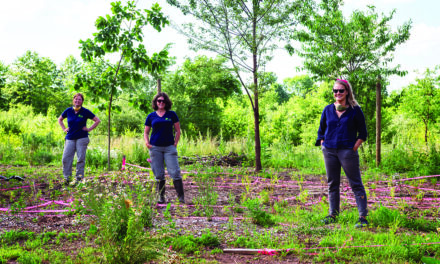Jamie Mucciarelli graduated from Ewing High School in 1991. She was a cheerleader, class president, and a generally well-liked girl. Her parents thought maybe she’d go into civics, find a house in the area, marry, and have kids.
It only took 45 minutes to change all that.
It was a hot June day in 1993, and 19-year-old Jamie Mucciarelli borrowed her parents’ car to return her cap and gown after graduation from Mercer County Community College, where she got her associate’s degree. About halfway to her destination, a traffic light was out at a major intersection, and cars were gridlocked. Knowing her mom needed the car, she pulled into a shopping center to find a phone and wound up at a military recruiter’s office. She walked in and asked the man in a dress blue uniform if she could borrow the phone.
His name was Danny McNamara, an Air Force sergeant, and in the minutes that followed, he would change everything.
She squared away a plan with her mom, and Sgt. McNamara engaged her in small talk. “He asked me, ‘Do you want to see the world? Do you want to get out of Dodge?’ That’s all I needed to hear. I still get goose bumps now thinking about it,” she says, holding out her arm. “I trusted everything he was saying.”
Mucciarelli, now 41, had been itching to find a way out of Ewing, N.J., to see the country, to carve out her own adventure, so she was instantly sold when he told her she could use her psychology degree to become a mental health technician in the Air Force. “I thought, I can do that job and live in another state, and you’re going to pay me? Since I was already 19, I didn’t need my parents to sign, so I did it—I enlisted in the Air Force right then and there,” Mucciarelli says. “That decision changed my whole life. It changed everything about who everybody thought I was going to be, what I wanted for myself, and what I thought I was confined to—it all changed that day.”
Mucciarelli went home, slapped the pink copy of her enlistment papers up on the fridge with a magnet, grabbed a bag of Doritos, and waited for her dad, a hardworking iron worker, to come home.
Boot Camp
The decision had been so sudden and seemingly out of the blue that her parents were bewildered and somewhat shell-shocked, Mucciarelli says. With great trepidation, they grudgingly helped her pack her Jordache overnight bag and drove her to Philadelphia on August 3, 1993, the day of her deployment to boot camp.
“We drove in silence the whole way to Philly. I got out of the car, and there was a sergeant that met us at the curb. He said, “no one is allowed upstairs except the recruit,’” she recalls. “My mom kind of leaned over in the car and hugged me. My dad got out, and I remember when he talked to me, his voice cracked. He said, ‘The Air Force will be proud to have you. I know so many people, but I don’t know anybody in the military who can help you if this doesn’t work out, babe.’ It all came together at that point why they were so mad—they couldn’t rescue their little girl if something happened.”

She waved goodbye to her parents, buzzing with excitement, not knowing she wouldn’t see them again until Christmas. She got on the plane, put Janet Jackson on her Discman, and headed to San Antonio for Air Force Boot Camp, which she refers to as a 6-week crash course in stress and anger management in 115-degree heat.
Learning to become “relish” (wearing nothing but green camouflage) proved to be challenging in ways Mucciarelli could not have predicted. “Every night we’d get into our racks, and I would just hear crying and sniffling from 49 other women in my squadron from all over the room,” she says. “After the first week, I was called every name in the book by my drill sergeants, but to this day, they are two of the men I respect more than almost anybody. They were horrible to us, but I understand why. That’s what it took for us to be rebuilt into relish and to become what the Air Force needed.”
Mucciarelli’s squadron was filled with women from just about every state and many of whom enlisted to escape poverty, abusive relationships, or mundane lives. “There were teen moms, there were girls who were raped and joined the military to get away from their perpetrator, and there were some who just knew they were bigger than the tiny town that ‘trapped’ them. They all wanted out of whatever their situation was, like me,” she says. “I wasn’t running from anything bad, per se. Community college, still living with my parents, not having my own car, working at a pharmacy selling lipsticks—it was just stifling to me.”
Despite her recruiter, Sgt. McNamara, warning her against it, Mucciarelli was made squadron dorm chief. “When my drill sergeant asked for volunteers, I didn’t volunteer. But he looked down the roster and saw that I was the only one who had any college, so he chose me, essentially making me responsible for all 49 other women and their mistakes,” she says. “Someone didn’t clean the latrine very well, so I got yelled at. Somebody didn’t fold her shirt into a perfect origami whatever, so I got my nose shoved in it. That’s what being the dorm chief was.”
After 6 grueling weeks that tested Mucciarelli’s physical and emotional limits, she graduated boot camp on her 20th birthday and headed to Sheppard Air Force Base in Wichita Falls for tech school, which she calls the best 4 months of her life. “It was like a mid-life crisis at 20. People got married. They bought Harleys. I made some of the best friends during those months. I got a tattoo. You can’t come out of the military without getting a tattoo,” Mucciarelli says.
She also learned how to become a mental health technician, known as a psych tech, which would be her role in the Air Force for the next 5 years.
She graduated December 20 and got to go home for Christmas to see her parents and younger brother, Justin, for the first time since she enlisted. She flew back to Philadelphia wearing her dress blues, bursting with satisfaction over everything she’d achieved. “My mom, dad, and brother were there to pick me up, and I wouldn’t take my uniform off because I was so proud of it,” she says. “Nobody had ever voluntarily served in the military in my family, and it felt incredible.”
Act Two
Eight years later, Mucciarelli watched the events of September 11 and felt she needed to do something. She was off active duty at that time and had been on Guard status for 3 years after getting married, serving 5 years as a psych tech at Travis Air Force Base near Sacramento, Calif., and then getting divorced. The wars in Iraq and Afghanistan were ramping up, and she felt she needed to get off the sidelines and do her part. “It’s survivor’s guilt. You feel like you’ve abandoned your team. That’s what they teach you in boot camp. You never leave anyone behind,” she says. “If I have all my limbs and the mental faculties to do the work, I should never quit. That’s ingrained in you.”
So at the end of 2002, she went back on active duty, and since her previous career field as a mental health tech had downsized, she seized an opportunity to become aircrew. It was somewhat of a long shot—only 2 percent of the Air Force was in a flying position, and at that time only 2 percent of them were women. Mucciarelli excelled on the academic testing, but then she had to face the physical component. “You had to lift 80 pounds above your waist, and I did it, not because I was a body builder, but because when I really want something, nothing is going to stop me,” she says. “I think I could have picked up 280 pounds that day.”
Mucciarelli, then 28, headed to Little Rock, Ark. for her training. “I was slinging wrenches around, using all brawn and no brain, really. That was the first time I feel like I truly challenged myself,” Mucciarelli says. “The government spent almost a million dollars training me. You have to go into the altitude chamber, you have to get a ton of immunizations because you’re going to be in very austere places, and you have to be qualified to wear a chemical mask and go into gas chambers.”

But then she was flown to Spokane, Wash. for Survival, Evasion, Resistance, and Escape (SERE) training (also called survival school), which was the most mentally challenging, intense, and terrifying experience of Mucciarelli’s life. “All aircrew have to go to survival school, because if your plane goes down, you have to know how to eat off the land, how to gut an animal and eat its insides, how to kill people, and how to resist giving information, even if you’re being beaten,” she says. “It was all hostage negotiation training. Psychologically, it was the hardest thing I’ve ever done.”
Mucciarelli can’t disclose many of the details, but she says she remembers regularly being kept in solitary confinement inside a box just large enough to fit her body. “I remember being scared to death that training would go too far.”
While she was frightened a lot and initially regretted her decision, Mucciarelli made it through survival school and learned techniques that helped her immeasurably on the job. “I learned how to eat ants, use a compass for triangulation, at what altitude you can jump out of a helicopter, how to build a tent with leaves and grass, how to tell what time of day it is, how to build a fire—I learned survival,” she explains. “It really was the hardest thing I’ve ever done in my whole life. It was awful, but it was so necessary.”
After survival school, Mucciarelli was stationed in Fayetteville, N.C. for the next 5½ years, working as active-duty loadmaster on the C130, the most tactical aircraft in the Air Force’s inventory. She was regularly deployed to Iraq and Afghanistan, one of two loadmasters aboard the C130 to make sure the aircraft was aerodynamically sound. “The first time we flew into Iraq, my heart was beating a mile a minute. But it just took one landing to see that I trusted everyone managing the plane, and they trusted me,” Mucciarelli recalls. “My primary job in flight was to look out the window and call it out if we were taking fire and give the clock position that the fire is coming from and from how many kilometers away. We could see the blasts with night vision goggles. I was actually more excited by it—I swear I became an adrenaline junky.”
In addition to bringing supplies to Army and Marine troops, providing humanitarian relief, and getting troops out of harm’s way of roadside bombs and other hot spots, the C130s also regularly carried the bodies of deceased military men and women as well as detainees, which could be both emotionally draining and profound for Mucciarelli.
“I would see people suffering or terrified, and I wanted to talk to them and hear what was happening in their minds, but that wasn’t my role,” Mucciarelli says. “It wasn’t my job to help them in that way. But I wanted to make it my job. I realized I wanted to advocate for those people whose worlds were forever changed.”
So despite her personal investment in the ongoing wars, she decided to leave the Air Force in 2008, feeling she could make a bigger impact by becoming a clinical social worker, helping people find their way through the fog of war.
Still Doing Her Part
Mucciarelli had watched the military downsize the mental health services in the 1990s—cutting programs like the 30-day substance abuse detox and inpatient psych hospitals. Its unofficial stance was that if someone had a mental health issue, he or she shouldn’t be in the military, so they didn’t need to provide as many mental health services, Mucciarelli says. But since Operation Iraqi Freedom and Operation Enduring Freedom (Afghanistan), she says they are more robust now than at any point during her service.
 Today she works as a primary care/mental health integration therapist for the Department of Veterans Affairs of the New Jersey Healthcare System in East Orange, evaluating veterans to help determine whether they are suffering from post-traumatic stress disorder (PTSD). For Mucciarelli, it’s a dream job in many ways—she’s combining her psych background with a unique ability to understand what many of her patients are going through, as she herself struggles with big crowds and loud noises.
Today she works as a primary care/mental health integration therapist for the Department of Veterans Affairs of the New Jersey Healthcare System in East Orange, evaluating veterans to help determine whether they are suffering from post-traumatic stress disorder (PTSD). For Mucciarelli, it’s a dream job in many ways—she’s combining her psych background with a unique ability to understand what many of her patients are going through, as she herself struggles with big crowds and loud noises.
“Professionals working with veterans in the mental health field who have also served in the military can make a difference because we understand what they are going through,” Mucciarelli says. “I love when I get veterans in my office who assume I know nothing about the military culture. They assume I have no idea what war might have been like. When it’s appropriate for me to share with them that I also served, you should see the looks on their faces! It helps their ability to trust me immeasurably. I wouldn’t be anywhere else except working with veterans.”
Despite the mixed emotions and ambiguity about war that led her to leave the Air Force, Mucciarelli wouldn’t change anything about her experience. “Joining the Air Force was the best thing I could’ve done for myself. It got me out of Dodge,” she says. “I found the way to do the work I always wanted to do.”








